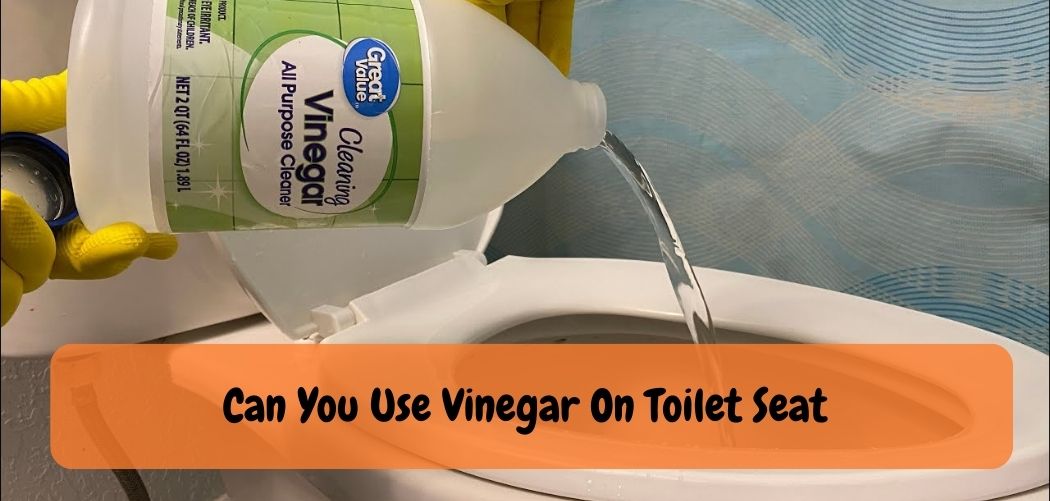Yes, vinegar can be used on a toilet seat to effectively clean and disinfect it. Vinegar is a natural and cost-effective cleaning agent that can eliminate bacteria, stains, and odors from toilet seats.
When it comes to maintaining a clean and hygienic bathroom, a plethora of cleaning agents is available at our fingertips. Among these options, vinegar has emerged as a natural and environmentally friendly solution with diverse cleaning properties.
While it’s well-known for its effectiveness in various cleaning tasks, questions arise about its suitability for one of the most frequently used surfaces in the bathroom: the toilet seat. Can vinegar, with its acidic nature, truly contribute to keeping your toilet seat spotless without causing any harm?
In this exploration, we delve into the science behind vinegar’s cleaning capabilities, its potential impact on different toilet seat materials, and the do’s and don’ts of using vinegar as a cleaning agent.
Get ready to discover whether vinegar holds the key to a naturally clean toilet seat or if there are nuances to consider before incorporating it into your cleaning routine.
Vinegar: The Ultimate Toilet Cleaner
Vinegar is one of the most versatile products in terms of household cleaning, including cleaning toilet seats. The acidic composition of vinegar makes it an excellent cleaner. It can disinfect and deodorize any surface while removing stubborn stains like limescale and rust.
To use vinegar as a toilet seat cleaner, dilute it with water and apply using a spray bottle or cloth. Leave it for a few minutes before scrubbing and rinsing. For best results, mix vinegar with essential oils to make it smell better.
With its various advantages, using vinegar to clean your toilet seat is an economical and eco-friendly option compared to harsh chemicals available in the market.
The Guide: Can You Use Vinegar on Your Toilet Seat? Navigating the Natural Cleaning Approach
Maintaining a clean and germ-free bathroom is essential for a comfortable living environment. With a plethora of cleaning agents available, many individuals are turning to natural alternatives, and vinegar has garnered significant attention for its versatile cleaning capabilities.
However, when it comes to the toilet seat—a surface that demands both cleanliness and longevity—questions arise about the compatibility of vinegar as a cleaning solution. In this comprehensive guide, we’ll explore the potential benefits and considerations of using vinegar on your toilet seat,
Helping you make an informed decision about incorporating this natural cleaner into your bathroom cleaning routine.
1. Understanding Vinegar’s Cleaning Properties
Acetic Acid Power: Exploring how acetic acid, a component of vinegar, contributes to its cleaning abilities.
Antibacterial Action: Vinegar’s natural antibacterial properties and their implications for toilet seat sanitation.
2. Toilet Seat Materials and Vinegar Compatibility
Plastic Toilet Seats: Assessing the impact of vinegar on plastic surfaces and potential benefits.
Wooden Toilet Seats: Navigating the delicate balance between vinegar’s cleaning power and wood preservation.
Enameled Toilet Seats: Understanding the interaction between vinegar and enamel coatings.
3. Benefits of Using Vinegar on Your Toilet Seat
Natural Disinfection: How vinegar’s acidity can help disinfect and kill germs on the toilet seat.
Stain Removal: Vinegar’s effectiveness in tackling mineral deposits, water stains, and other blemishes.
4. Proper Usage and Application
Dilution Guidelines: Achieving an appropriate vinegar-to-water ratio for safe cleaning.
Application Techniques: Detailing step-by-step instructions for using vinegar on your toilet seat.
Avoiding Overuse: Preventing potential damage from excessive or prolonged vinegar exposure.
5. Considerations and Precautions
Sensitivity to Odor: Addressing concerns about the lingering scent of vinegar in the bathroom.
Compatibility Testing: Conducting a spot test to ensure your toilet seat material reacts well to vinegar.
Avoiding Harsh Brushes: Opting for soft-bristle brushes to prevent scratching sensitive surfaces.
6. Alternatives to Vinegar for Toilet Seat Cleaning
Baking Soda: Exploring the gentle abrasive properties of baking soda for cleaning toilet seats.
Commercial Eco-Friendly Cleaners: Identifying commercially available natural cleaners as alternatives to vinegar.
7. Balancing Natural Cleaning with Material Longevity
Regular Maintenance: Emphasizing the importance of consistent cleaning for preventing tough stains.
Longevity Considerations: Weighing the benefits of natural cleaning with the potential wear and tear on toilet seat materials.
Also Read: Discover the Truth: Can You Safely Use Harpic on Your Toilet Seat?
Say Goodbye To Chemical Cleaners
Using chemical cleaners in your toilet can result in respiratory issues and environmental pollution. Vinegar is a safer, more environmentally friendly option for keeping your toilet clean.
It is also affordable and accessible for everyone. By using vinegar instead of chemical cleaners, you can enjoy a clean toilet without compromising your health or the environment.
Making the switch to vinegar is a simple way to introduce eco-friendly cleaning habits into your life. So, next time you’re cleaning your toilet seat, consider using vinegar instead of harsh chemical cleaners.
Diy Vinegar Toilet Cleaner Recipes
Vinegar is a versatile substance that can be used for a variety of cleaning applications, including the toilet seat. Below, we have listed several vinegar-based cleaning solutions, which are easy to make and customizable to fit individual needs. To create a basic solution, simply mix vinegar and water in equal parts.
For added disinfectant properties, add a few drops of tea tree oil or lemon essential oil. Baking soda can also be added to create a paste that is effective in removing stubborn stains. By using diy cleaners like these, individuals can save money and cut down on the amount of waste generated by disposable cleaning products.
With these easy-to-follow recipes, anyone can keep their toilet seat clean without harsh chemicals or excessive spending.
Frequently Asked Questions On Can You Use Vinegar On Toilet Seat?
Can You Clean A Toilet Seat With Vinegar?
Yes, you can clean a toilet seat with vinegar. Mix vinegar and water for better results.
Will Vinegar Damage My Toilet Seat?
No, vinegar will not damage your toilet seat. In fact, it is a safe and effective cleaner.
How Do I Remove Stains From My Toilet Seat With Vinegar?
Mix vinegar and baking soda to remove stains from your toilet seat. Scrub gently and rinse off.
Is Vinegar An Effective Disinfectant For A Toilet Seat?
Yes, vinegar has disinfectant properties. However, it is recommended to use a commercial disinfectant for better results.
Can I Use Vinegar To Remove Germs From A Toilet Seat?
Yes, vinegar can remove germs from a toilet seat. However, it is better to use a commercial disinfectant for better results.
Conclusion
Overall, vinegar is a safe and effective cleaning agent that can be used on toilet seats. It’s affordable and easily accessible, making it the go-to choice for many households. However, it’s important to use caution when mixing it with other cleaning products and to avoid using it on porous surfaces like marble or granite.
Always test a small, inconspicuous spot before using vinegar on your toilet seat to ensure it won’t cause any damage. Vinegar is also a great option for eliminating odors and reducing the spread of germs in your home.
Whether you’re looking for an eco-friendly cleaning solution or simply want to save money, vinegar is definitely worth considering. Just remember to use it safely and in accordance with manufacturer guidelines.









